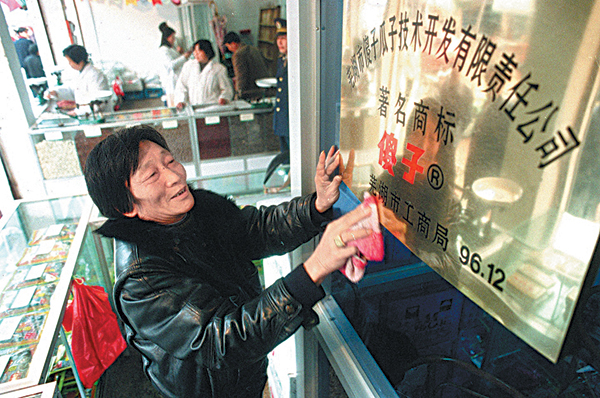Legacy of reform
By AN BAIJIE (China Daily) Updated: 2014-08-22 06:39
|
 |
|
Nian Guangjiu at one of his shops in Wuhu, Anhui province. [Photp by Xinhua] |
Great achievements
Deng's historic contributions to China are being commemorated nationwide with the 110th anniversary of his birth which falls on Friday (August 22).
Since early this month, audiences have been glued to their TV sets showing the 48-episode drama series Deng Xiaoping at History's Crossroad.
The series describes Deng's experiences between October 1976, when the disastrous "culture revolution (1966-76)" ended, and 1984, when the policy of reform and opening-up was fully implemented.
On Aug 14, a photo exhibition marking the historical Baise Uprising was also opened to the public in Guangzhou and Shenzhen cities. Eighty-five years ago, Deng led an uprising in Baise city of South China's Guangxi Zhuang autonomous region and set up a revolutionary base there.
In Deng's hometown of Guang'an city, Southwest China's Sichuan province, the Hanlin Primary School, where Deng used to studied, was renamed the Red Army Primary School on Feb 19, the 17th anniversary of Deng's death. Since June, the Study Times, a newspaper run by the Party School of the CPC Central Committee, has published at least four articles related to Deng, including his standard for selecting government officials.On Aug 16, Hu Chunhua, Party chief of South China's Guangdong province, said at a seminar to commemorate Deng that it was Deng who encouraged the historic reform measures in Guangdong.
President Xi Jinping has spoken highly of the reform pushed by Deng many times. On Dec 8, 2012, less than a month after Xi was elected as general secretary of the CPC Central Committee, he visited Guangdong and paid tribute at a statue of Deng in a park.
The CPC Central Committee's decision of reform and opening-up is right, which should be maintained to make the country stronger and the people richer, Xi said to the people in the park.
In November last year, a comprehensive reform package was publicized after the third plenary session of the 18th CPC Central Committee. According to the plan, there would be 60 reform tasks covering the issues including hukou (household registration), urbanization, and family planning. After the session, a leading team, headed by Xi, was established to deepen reform.
The central and local governments' activities in commemorating Deng Xiaoping show that China's top leaders will continue their efforts to deepen reform, said Wang Yukai, a professor of public administration with Chinese Academy of Governance, a government-backed think tank.
The central government has made great achievements in fighting corruption, which is expected to clear obstacles for the reform, he said.
Zhou Qiren, an economist and professor of Peking University, said during a seminar early this year that the central government is facing tougher reform tasks compared with those in the 1980s, according to a report by major information portal Sina.com.
There are many more social problems and conflicts nowadays, including stagnant land reform in rural areas, lack of scientific research in universities, private companies bribing government officials, and serious pollution, he told a seminar.
Zheng Bin, a fodder manufacturer in Rizhao city of East China's Shandong province, said that compared with State-owned enterprises, private companies still face numerous difficulties in many issues including market access and loan applications.
The ongoing reform should bring more opportunities for private companies, especially small and medium size ones, "like what had been offered at the beginning of reform and opening-up", he said.
Zhu Lixin in Hefei contributed to this story.
- Govt encourages people to work 4.5 days a week
- Action to be taken as HIV cases among students rise
- Debate grows over reproductive rights
- Country's first bishop ordained in 3 years
- China builds Tibetan Buddhism academy in Chengdu
- Authorities require reporting of HIV infections at schools
- Typhoon Soudelor kills 14 in East China
- Police crack down on overseas gambling site
- Debate over death penalty for child traffickers goes on
- Beijing to tighten mail security for war anniversary







